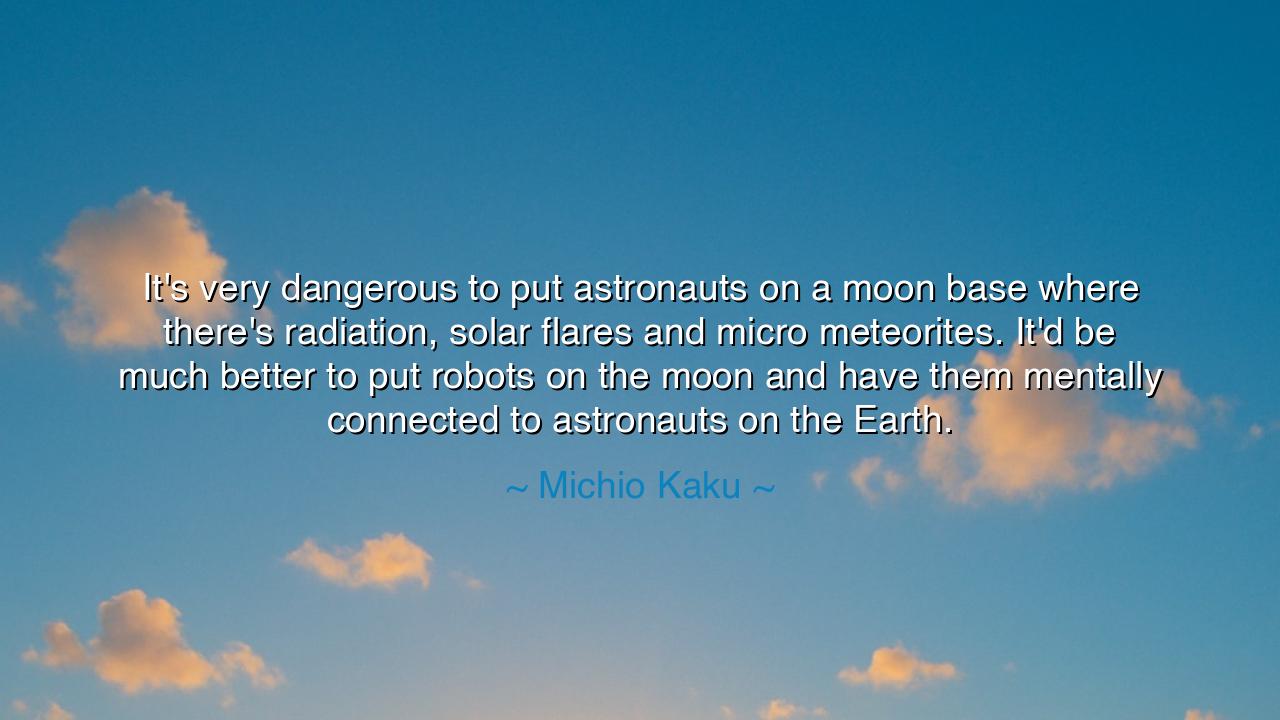
It's very dangerous to put astronauts on a moon base where
It's very dangerous to put astronauts on a moon base where there's radiation, solar flares and micro meteorites. It'd be much better to put robots on the moon and have them mentally connected to astronauts on the Earth.






"It's very dangerous to put astronauts on a moon base where there's radiation, solar flares and micro meteorites. It'd be much better to put robots on the moon and have them mentally connected to astronauts on the Earth." — these words spoken by Michio Kaku remind us of the inherent dangers and risks that accompany the pioneering spirit of space exploration. Kaku, a brilliant physicist and futurist, presents a vision of the future where technology, rather than humans directly, takes on the perilous work of venturing into the unknown. His call for the use of robots to explore distant worlds is not merely a matter of safety, but a challenge to our perceptions of human capability and the balance between risk and reward in the pursuit of progress.
In the ancient world, explorers and adventurers would often undertake journeys fraught with danger, from the seafaring voyages of Odysseus to the treks across the unknown lands of Alexander the Great. Each was a pursuit of greatness, but also a confrontation with the perils of the unknown. The ancient heroes faced monsters, storms, and uncharted territories, yet they pushed forward, driven by ambition, honor, and the thirst for discovery. Similarly, humanity’s quest to reach the moon and beyond is driven by a desire for knowledge, but the perils of space are vast, and it is not simply the bravery of the astronauts that will ensure our success, but also our ability to think strategically, to harness the power of technology to minimize risk and maximize the possibility of discovery.
Kaku’s statement draws attention to the fierce dangers that astronauts would face on a moon base. Radiation, solar flares, and the threat of micro meteorites are all very real hazards in space, yet they are often overlooked in the excitement of space exploration. The moon, while a monumental achievement for humanity, is not a hospitable environment for human life. Its surface is bombarded with dangerous cosmic radiation and lacks an atmosphere to protect against the sun’s rays. Kaku’s suggestion of using robots to undertake tasks that might put human lives in danger is a call to not only embrace technological advancement but to recognize that the future of space exploration may require a rethinking of how we interact with the cosmos.
Consider the example of NASA’s Curiosity Rover, which was sent to explore the surface of Mars in 2012. Curiosity, a marvel of engineering and technology, has spent years traversing the Martian landscape, gathering data and sending it back to Earth. The rover has endured extreme temperatures, radiation, and dust storms—factors that would have made a human mission to Mars incredibly dangerous. In this case, technology has become the means by which humanity explores the farthest reaches of space without putting human lives in direct harm. The success of Curiosity has paved the way for the possibility of more autonomous robots exploring distant worlds, collecting invaluable data that would have been impossible to obtain without risking human lives.
Kaku’s vision, though grounded in caution, reflects the wisdom of ancient philosophers who recognized the importance of both courage and prudence. Socrates, for example, believed that the pursuit of knowledge must be tempered with wisdom. The same can be said for space exploration. While humanity’s desire to reach the stars is noble and courageous, it must be paired with strategic thinking and a commitment to protecting the well-being of those who lead the charge. Just as the ancient explorers did not rush blindly into unknown territories but carefully planned their journeys, so must we approach space exploration with a careful balance of ambition and caution.
The lesson here is one of balance—the need to weigh the pursuit of progress with the recognition of danger. We must not be blinded by the excitement of discovery but should act with the foresight of those who came before us. It is not enough to simply dream of reaching the stars; we must also prepare for the practical realities of the journey. In doing so, we can create a future where the human spirit continues to explore the cosmos, but not at the cost of human lives. Instead, we can use our greatest invention—the mind—to develop technology that allows us to push the boundaries of exploration while keeping us safe.
In our own lives, we can learn from Kaku’s words by evaluating risks and seeking solutions that allow us to move forward without recklessness. Whether we are pursuing a career, embarking on personal projects, or striving toward greater goals, it is crucial that we think not only of the rewards but of the challenges and dangers that may lie ahead. Let us embrace innovation and technology as tools to overcome obstacles, to protect our wellbeing, and to create a future where human potential can flourish without compromising our safety or humanity. In this balance between boldness and caution, we find the true essence of progress.






AAdministratorAdministrator
Welcome, honored guests. Please leave a comment, we will respond soon